Fleurs du Mal Magazine


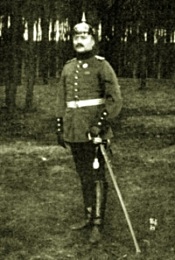
Schön
Wissen Tören
Wahr und Trügen
Mord Gebären
Sterben Sein
Weinen Jubeln
Haß Vergehen
Stark und Schwach
Unmöglich
Kann!
Dein Körper flammt!
Die Welt
Erlischt!
August Stramm
(1874-1915)
Schön, 1914
• fleursdumal.nl magazine
More in: *War Poetry Archive, Archive S-T, Expressionism, Stramm, August
“Chi dice mal d’amore
Dice una falsità!”
—Italian Song.
The time of the occurrence of the little legend about to be narrated, was that of the commencement of the reign of Henry IV. of France, whose accession and conversion, while they brought peace to the kingdom whose throne he ascended, were inadequate to heal the deep wounds mutually inflicted by the inimical parties.
Private feuds, and the memory of mortal injuries, existed between those now apparently united; and often did the hands that had clasped each other in seeming friendly greeting, involuntarily, as the grasp was released, clasp the dagger’s hilt, as fitter spokesman to their passions than the words of courtesy that had just fallen from their lips. Many of the fiercer Catholics retreated to their distant provinces; and while they concealed in solitude their rankling discontent, not less keenly did they long for the day when they might show it openly.
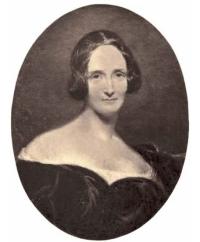 In a large and fortified chateau built on a rugged steep overlooking the Loire, not far from the town of Nantes, dwelt the last of her race, and the heiress of their fortunes, the young and beautiful Countess de Villeneuve. She had spent the preceding year in complete solitude in her secluded abode; and the mourning she wore for a father and two brothers, the victims of the civil wars, was a graceful and good reason why she did not appear at court, and mingle with its festivities. But the orphan countess inherited a high name and broad lands; and it was soon signified to her that the king, her guardian, desired that she should bestow them, together with her hand, upon some noble whose birth and accomplishments should entitle him to the gift. Constance, in reply, expressed her intention of taking vows, and retiring to a convent. The king earnestly and resolutely forbade this act, believing such an idea to be the result of sensibility overwrought by sorrow, and relying on the hope that, after a time, the genial spirit of youth would break through this cloud.
In a large and fortified chateau built on a rugged steep overlooking the Loire, not far from the town of Nantes, dwelt the last of her race, and the heiress of their fortunes, the young and beautiful Countess de Villeneuve. She had spent the preceding year in complete solitude in her secluded abode; and the mourning she wore for a father and two brothers, the victims of the civil wars, was a graceful and good reason why she did not appear at court, and mingle with its festivities. But the orphan countess inherited a high name and broad lands; and it was soon signified to her that the king, her guardian, desired that she should bestow them, together with her hand, upon some noble whose birth and accomplishments should entitle him to the gift. Constance, in reply, expressed her intention of taking vows, and retiring to a convent. The king earnestly and resolutely forbade this act, believing such an idea to be the result of sensibility overwrought by sorrow, and relying on the hope that, after a time, the genial spirit of youth would break through this cloud.
A year passed, and still the countess persisted; and at last Henry, unwilling to exercise compulsion,—desirous, too, of judging for himself of the motives that led one so beautiful, young, and gifted with fortune’s favours, to desire to bury herself in a cloister,—announced his intention, now that the period of her mourning was expired, of visiting her chateau; and if he brought not with him, the monarch said, inducement sufficient to change her design, he would yield his consent to its fulfilment.
Many a sad hour had Constance passed—many a day of tears, and many a night of restless misery. She had closed her gates against every visitant; and, like the Lady Olivia in “Twelfth Night,” vowed herself to loneliness and weeping. Mistress of herself, she easily silenced the entreaties and remonstrances of underlings, and nursed her grief as it had been the thing she loved. Yet it was too keen, too bitter, too burning, to be a favoured guest. In fact, Constance, young, ardent, and vivacious, battled with it, struggled, and longed to cast it off; but all that was joyful in itself, or fair in outward show, only served to renew it; and she could best support the burden of her sorrow with patience, when, yielding to it, it oppressed but did not torture her.
Constance had left the castle to wander in the neighbouring grounds. Lofty and extensive as were the apartments of her abode, she felt pent up within their walls, beneath their fretted roofs. The spreading uplands and the antique wood, associated to her with every dear recollection of her past life, enticed her to spend hours and days beneath their leafy coverts. The motion and change eternally working, as the wind stirred among the boughs, or the journeying sun rained its beams through them, soothed and called her out of that dull sorrow which clutched her heart with so unrelenting a pang beneath her castle roof.
There was one spot on the verge of the well-wooded park, one nook of ground, whence she could discern the country extended beyond, yet which was in itself thick set with tall umbrageous trees—a spot which she had forsworn, yet whither unconsciously her steps for ever tended, and where now again, for the twentieth time that day, she had unaware found herself. She sat upon a grassy mound, and looked wistfully on the flowers she had herself planted to adorn the verdurous recess—to her the temple of memory and love. She held the letter from the king which was the parent to her of so much despair. Dejection sat upon her features, and her gentle heart asked fate why, so young, unprotected, and forsaken, she should have to struggle with this new form of wretchedness.
“I but ask,” she thought, “to live in my father’s halls—in the spot familiar to my infancy—to water with my frequent tears the graves of those I loved; and here in these woods, where such a mad dream of happiness was mine, to celebrate for ever the obsequies of Hope!”
A rustling among the boughs now met her ear—her heart beat quick—all again was still.
“Foolish girl!” she half muttered; “dupe of thine own passionate fancy: because here we met; because seated here I have expected, and sounds like these have announced, his dear approach; so now every coney as it stirs, and every bird as it awakens silence, speaks of him. O Gaspar!—mine once—never again will this beloved spot be made glad by thee—never more!”
Again the bushes were stirred, and footsteps were heard in the brake. She rose; her heart beat high; it must be that silly Manon, with her impertinent entreaties for her to return. But the steps were firmer and slower than would be those of her waiting-woman; and now emerging from the shade, she too plainly discerned the intruder. Her first impulse was to fly:—but once again to see him—to hear his voice:—once again before she placed eternal vows between them, to stand together, and find the wide chasm filled which absence had made, could not injure the dead, and would soften the fatal sorrow that made her cheek so pale.
And now he was before her, the same beloved one with whom she had exchanged vows of constancy. He, like her, seemed sad; nor could she resist the imploring glance that entreated her for one moment to remain.
“I come, lady,” said the young knight, “without a hope to bend your inflexible will. I come but once again to see you, and to bid you farewell before I depart for the Holy Land. I come to beseech you not to immure yourself in the dark cloister to avoid one as hateful as myself,—one you will never see more. Whether I die or live, France and I are parted for ever!”
“That were fearful, were it true,” said Constance; “but King Henry will never so lose his favourite cavalier. The throne you helped to build, you still will guard. Nay, as I ever had power over thought of thine, go not to Palestine.”
“One word of yours could detain me—one smile—Constance”—and the youthful lover knelt before her; but her harsher purpose was recalled by the image once so dear and familiar, now so strange and so forbidden.
“Linger no longer here!” she cried. “No smile, no word of mine will ever again be yours. Why are you here—here, where the spirits of the dead wander, and, claiming these shades as their own, curse the false girl who permits their murderer to disturb their sacred repose?”
“When love was young and you were kind,” replied the knight, “you taught me to thread the intricacies of these woods—you welcomed me to this dear spot, where once you vowed to be my own—even beneath these ancient trees.”
“A wicked sin it was,” said Constance, “to unbar my father’s doors to the son of his enemy, and dearly is it punished!”
The young knight gained courage as she spoke; yet he dared not move, lest she, who, every instant, appeared ready to take flight, should be startled from her momentary tranquillity; but he slowly replied:—“Those were happy days, Constance, full of terror and deep joy, when evening brought me to your feet; and while hate and vengeance were as its atmosphere to yonder frowning castle, this leafy, starlit bower was the shrine of love.”
“Happy?—miserable days!” echoed Constance; “when I imagined good could arise from failing in my duty, and that disobedience would be rewarded of God. Speak not of love, Gaspar!—a sea of blood divides us for ever! Approach me not! The dead and the beloved stand even now between us: their pale shadows warn me of my fault, and menace me for listening to their murderer.”
“That am not I!” exclaimed the youth. “Behold, Constance, we are each the last of our race. Death has dealt cruelly with us, and we are alone. It was not so when first we loved—when parent, kinsman, brother, nay, my own mother breathed curses on the house of Villeneuve; and in spite of all I blessed it. I saw thee, my lovely one, and blessed it. The God of peace planted love in our hearts, and with mystery and secrecy we met during many a summer night in the moonlit dells; and when daylight was abroad, in this sweet recess we fled to avoid its scrutiny, and here, even here, where now I kneel in supplication, we both knelt and made our vows. Shall they be broken?”
Constance wept as her lover recalled the images of happy hours. “Never,” she exclaimed, “O never! Thou knowest, or wilt soon know, Gaspar, the faith and resolves of one who dare not be yours. Was it for us to talk of love and happiness, when war, and hate, and blood were raging around? The fleeting flowers our young hands strewed were trampled by the deadly encounter of mortal foes. By your father’s hand mine died; and little boots it to know whether, as my brother swore, and you deny, your hand did or did not deal the blow that destroyed him. You fought among those by whom he died. Say no more—no other word: it is impiety towards the unreposing dead to hear you. Go, Gaspar; forget me. Under the chivalrous and gallant Henry your career may be glorious; and some fair girl will listen, as once I did, to your vows, and be made happy by them. Farewell! May the Virgin bless you! In my cell and cloister-home I will not forget the best Christian lesson—to pray for our enemies. Gaspar, farewell!”
She glided hastily from the bower: with swift steps she threaded the glade and sought the castle. Once within the seclusion of her own apartment she gave way to the burst of grief that tore her gentle bosom like a tempest; for hers was that worst sorrow which taints past joys, making remorse wait upon the memory of bliss, and linking love and fancied guilt in such fearful society as that of the tyrant when he bound a living body to a corpse. Suddenly a thought darted into her mind. At first she rejected it as puerile and superstitious; but it would not be driven away. She called hastily for her attendant. “Manon,” she said, “didst thou ever sleep on St. Catherine’s couch?”
Manon crossed herself. “Heaven forefend! None ever did, since I was born, but two: one fell into the Loire and was drowned; the other only looked upon the narrow bed, and returned to her own home without a word. It is an awful place; and if the votary have not led a pious and good life, woe betide the hour when she rests her head on the holy stone!”
Constance crossed herself also. “As for our lives, it is only through our Lord and the blessed saints that we can any of us hope for righteousness. I will sleep on that couch to-morrow night!”
“Dear, my lady! and the king arrives to-morrow.”
“The more need that I resolve. It cannot be that misery so intense should dwell in any heart, and no cure be found. I had hoped to be the bringer of peace to our houses; and is the good work to be for me a crown of thorns? Heaven shall direct me. I will rest to-morrow night on St. Catherine’s bed: and if, as I have heard, the saint deigns to direct her votaries in dreams, I will be guided by her; and, believing that I act according to the dictates of Heaven, I shall feel resigned even to the worst.”
The king was on his way to Nantes from Paris, and he slept on this night at a castle but a few miles distant. Before dawn a young cavalier was introduced into his chamber. The knight had a serious, nay, a sad aspect; and all beautiful as he was in feature and limb, looked wayworn and haggard. He stood silent in Henry’s presence, who, alert and gay, turned his lively blue eyes upon his guest, saying gently, “So thou foundest her obdurate, Gaspar?”
“I found her resolved on our mutual misery. Alas! my liege, it is not, credit me, the least of my grief, that Constance sacrifices her own happiness when she destroys mine.”
“And thou believest that she will say nay to the gaillard chevalier whom we ourselves present to her?”
“Oh, my liege, think not that thought! it cannot be. My heart deeply, most deeply, thanks you for your generous condescension. But she whom her lover’s voice in solitude—whose entreaties, when memory and seclusion aided the spell—could not persuade, will resist even your majesty’s commands. She is bent upon entering a cloister; and I, so please you, will now take my leave:—I am henceforth a soldier of the cross.”
“Gaspar,” said the monarch, “I know woman better than thou. It is not by submission nor tearful plaints she is to be won. The death of her relatives naturally sits heavy at the young countess’s heart; and nourishing in solitude her regret and her repentance, she fancies that Heaven itself forbids your union. Let the voice of the world reach her—the voice of earthly power and earthly kindness—the one commanding, the other pleading, and both finding response in her own heart—and by my fay and the Holy Cross, she will be yours. Let our plan still hold. And now to horse: the morning wears, and the sun is risen.”
The king arrived at the bishop’s palace, and proceeded forthwith to mass in the cathedral. A sumptuous dinner succeeded, and it was afternoon before the monarch proceeded through the town beside the Loire to where, a little above Nantes, the Chateau Villeneuve was situated. The young countess received him at the gate. Henry looked in vain for the cheek blanched by misery, the aspect of downcast despair which he had been taught to expect. Her cheek was flushed, her manner animated, her voice scarce tremulous. “She loves him not,” thought Henry, “or already her heart has consented.”
A collation was prepared for the monarch; and after some little hesitation, arising even from the cheerfulness of her mien, he mentioned the name of Gaspar. Constance blushed instead of turning pale, and replied very quickly, “To-morrow, good my liege; I ask for a respite but until to-morrow;—all will then be decided;—to-morrow I am vowed to God—or”—
She looked confused, and the king, at once surprised and pleased, said, “Then you hate not young De Vaudemont;—you forgive him for the inimical blood that warms his veins.”
“We are taught that we should forgive, that we should love our enemies,” the countess replied, with some trepidation.
“Now, by Saint Denis, that is a right welcome answer for the novice,” said the king, laughing. “What ho! my faithful serving-man, Dan Apollo in disguise! come forward, and thank your lady for her love.”
In such disguise as had concealed him from all, the cavalier had hung behind, and viewed with infinite surprise the demeanour and calm countenance of the lady. He could not hear her words: but was this even she whom he had seen trembling and weeping the evening before?—this she whose very heart was torn by conflicting passion?—who saw the pale ghosts of parent and kinsman stand between her and the lover whom more than her life she adored? It was a riddle hard to solve. The king’s call was in unison with his impatience, and he sprang forward. He was at her feet; while she, still passion-driven, overwrought by the very calmness she had assumed, uttered one cry as she recognised him, and sank senseless on the floor.
All this was very unintelligible. Even when her attendants had brought her to life, another fit succeeded, and then passionate floods of tears; while the monarch, waiting in the hall, eyeing the half-eaten collation, and humming some romance in commemoration of woman’s waywardness, knew not how to reply to Vaudemont’s look of bitter disappointment and anxiety. At length the countess’ chief attendant came with an apology: “Her lady was ill, very ill The next day she would throw herself at the king’s feet, at once to solicit his excuse, and to disclose her purpose.”
“To-morrow—again to-morrow!—Does to-morrow bear some charm, maiden?” said the king. “Can you read us the riddle, pretty one? What strange tale belongs to to-morrow, that all rests on its advent?”
Manon coloured, looked down, and hesitated. But Henry was no tyro in the art of enticing ladies’ attendants to disclose their ladies’ counsel. Manon was besides frightened by the countess’ scheme, on which she was still obstinately bent, so she was the more readily induced to betray it. To sleep in St. Catherine’s bed, to rest on a narrow ledge overhanging the deep rapid Loire, and if, as was most probable, the luckless dreamer escaped from falling into it, to take the disturbed visions that such uneasy slumber might produce for the dictate of Heaven, was a madness of which even Henry himself could scarcely deem any woman capable. But could Constance, her whose beauty was so highly intellectual, and whom he had heard perpetually praised for her strength of mind and talents, could she be so strangely infatuated! And can passion play such freaks with us?—like death, levelling even the aristocracy of the soul, and bringing noble and peasant, the wise and foolish, under one thraldom? It was strange—yet she must have her way. That she hesitated in her decision was much; and it was to be hoped that St. Catherine would play no ill-natured part. Should it be otherwise, a purpose to be swayed by a dream might be influenced by other waking thoughts. To the more material kind of danger some safeguard should be brought.
There is no feeling more awful than that which invades a weak human heart bent upon gratifying its ungovernable impulses in contradiction to the dictates of conscience. Forbidden pleasures are said to be the most agreeable;—it may be so to rude natures, to those who love to struggle, combat, and contend; who find happiness in a fray, and joy in the conflict of passion. But softer and sweeter was the gentle spirit of Constance; and love and duty contending crushed and tortured her poor heart. To commit her conduct to the inspirations of religion, or, if it was so to be named, of superstition, was a blessed relief. The very perils that threatened her undertaking gave a zest to it;—to dare for his sake was happiness;—the very difficulty of the way that led to the completion of her wishes at once gratified her love and distracted her thoughts from her despair. Or if it was decreed that she must sacrifice all, the risk of danger and of death were of trifling import in comparison with the anguish which would then be her portion for ever.
The night threatened to be stormy, the raging wind shook the casements, and the trees waved their huge shadowy arms, as giants might in fantastic dance and mortal broil. Constance and Manon, unattended, quitted the chateau by a postern, and began to descend the hill-side. The moon had not yet risen; and though the way was familiar to both, Manon tottered and trembled; while the countess, drawing her silken cloak round her, walked with a firm step down the steep. They came to the river’s side, where a small boat was moored, and one man was in waiting. Constance stepped lightly in, and then aided her fearful companion. In a few moments they were in the middle of the stream. The warm, tempestuous, animating, equinoctial wind swept over them. For the first time since her mourning, a thrill of pleasure swelled the bosom of Constance. She hailed the emotion with double joy. It cannot be, she thought, that Heaven will forbid me to love one so brave, so generous, and so good as the noble Gaspar. Another I can never love; I shall die if divided from him; and this heart, these limbs, so alive with glowing sensation, are they already predestined to an early grave? Oh no! life speaks aloud within them. I shall live to love. Do not all things love?—the winds as they whisper to the rushing waters? the waters as they kiss the flowery banks, and speed to mingle with the sea? Heaven and earth are sustained by, and live through, love; and shall Constance alone, whose heart has ever been a deep, gushing, overflowing well of true affection, be compelled to set a stone upon the fount to lock it up for ever?
These thoughts bade fair for pleasant dreams; and perhaps the countess, an adept in the blind god’s lore, therefore indulged them the more readily. But as thus she was engrossed by soft emotions, Manon caught her arm:—“Lady, look,” she cried; “it comes—yet the oars have no sound. Now the Virgin shield us! Would we were at home!”
A dark boat glided by them. Four rowers, habited in black cloaks, pulled at oars which, as Manon said, gave no sound; another sat at the helm: like the rest, his person was veiled in a dark mantle, but he wore no cap; and though his face was turned from them, Constance recognised her lover. “Gaspar,” she cried aloud, “dost thou live?”—but the figure in the boat neither turned its head nor replied, and quickly it was lost in the shadowy waters.
How changed now was the fair countess’ reverie! Already Heaven had begun its spell, and unearthly forms were around, as she strained her eyes through the gloom. Now she saw and now she lost view of the bark that occasioned her terror; and now it seemed that another was there, which held the spirits of the dead; and her father waved to her from shore, and her brothers frowned on her.
Meanwhile they neared the landing. Her bark was moored in a little cove, and Constance stood upon the bank. Now she trembled, and half yielded to Manon’s entreaty to return; till the unwise suivante mentioned the king’s and De Vaudemont’s name, and spoke of the answer to be given to-morrow. What answer, if she turned back from her intent?
She now hurried forward up the broken ground of the bank, and then along its edge, till they came to a hill which abruptly hung over the tide. A small chapel stood near. With trembling fingers the countess drew forth the key and unlocked its door. They entered. It was dark—save that a little lamp, flickering in the wind, showed an uncertain light from before the figure of Saint Catherine. The two women knelt; they prayed; and then rising, with a cheerful accent the countess bade her attendant good-night. She unlocked a little low iron door. It opened on a narrow cavern. The roar of waters was heard beyond. “Thou mayest not follow, my poor Manon,” said Constance,—“nor dost thou much desire:—this adventure is for me alone.”
It was hardly fair to leave the trembling servant in the chapel alone, who had neither hope nor fear, nor love, nor grief to beguile her; but, in those days, esquires and waiting-women often played the part of subalterns in the army, gaining knocks and no fame. Besides, Manon was safe in holy ground. The countess meanwhile pursued her way groping in the dark through the narrow tortuous passage. At length what seemed light to her long-darkened sense gleamed on her. She reached an open cavern in the overhanging hill’s side, looking over the rushing tide beneath. She looked out upon the night. The waters of the Loire were speeding, as since that day have they ever sped—changeful, yet the same; the heavens were thickly veiled with clouds, and the wind in the trees was as mournful and ill-omened as if it rushed round a murderer’s tomb. Constance shuddered a little, and looked upon her bed,—a narrow ledge of earth and a moss-grown stone bordering on the very verge of the precipice. She doffed her mantle,—such was one of the conditions of the spell;—she bowed her head, and loosened the tresses of her dark hair; she bared her feet; and thus, fully prepared for suffering to the utmost the chill influence of the cold night, she stretched herself on the narrow couch that scarce afforded room for her repose, and whence, if she moved in sleep, she must be precipitated into the cold waters below.
At first it seemed to her as if she never should sleep again. No great wonder that exposure to the blast and her perilous position should forbid her eyelids to close. At length she fell into a reverie so soft and soothing that she wished even to watch; and then by degrees her senses became confused; and now she was on St. Catherine’s bed—the Loire rushing beneath, and the wild wind sweeping by—and now—oh whither?—and what dreams did the saint send, to drive her to despair, or to bid her be blest for ever?
Beneath the rugged hill, upon the dark tide, another watched, who feared a thousand things, and scarce dared hope. He had meant to precede the lady on her way, but when he found that he had outstayed his time, with muffled oars and breathless haste he had shot by the bark that contained his Constance, nor even turned at her voice, fearful to incur her blame, and her commands to return. He had seen her emerge from the passage, and shuddered as she leant over the cliff. He saw her step forth, clad as she was in white, and could mark her as she lay on the ledge beetling above. What a vigil did the lovers keep!—she given up to visionary thoughts, he knowing—and the consciousness thrilled his bosom with strange emotion—that love, and love for him, had led her to that perilous couch; and that while dangers surrounded her in every shape, she was alive only to the small still voice that whispered to her heart the dream which was to decide their destinies. She slept perhaps—but he waked and watched, and night wore away, as, now praying, now entranced by alternating hope and fear, he sat in his boat, his eyes fixed on the white garb of the slumberer above.
Morning—was it morning that struggled in the clouds? Would morning ever come to waken her? And had she slept? and what dreams of weal or woe had peopled her sleep? Gaspar grew impatient. He commanded his boatmen still to wait, and he sprang forward, intent on clambering the precipice. In vain they urged the danger, nay, the impossibility of the attempt; he clung to the rugged face of the hill, and found footing where it would seem no footing was. The acclivity, indeed, was not high; the dangers of St. Catherine’s bed arising from the likelihood that any one who slept on so narrow a couch would be precipitated into the waters beneath. Up the steep ascent Gaspar continued to toil, and at last reached the roots of a tree that grew near the summit. Aided by its branches, he made good his stand at the very extremity of the ledge, near the pillow on which lay the uncovered head of his beloved. Her hands were folded on her bosom; her dark hair fell round her throat and pillowed her cheek; her face was serene: sleep was there in all its innocence and in all its helplessness; every wilder emotion was hushed, and her bosom heaved in regular breathing. He could see her heart beat as it lifted her fair hands crossed above. No statue hewn of marble in monumental effigy was ever half so fair; and within that surpassing form dwelt a soul true, tender, self-devoted, and affectionate as ever warmed a human breast.
With what deep passion did Gaspar gaze, gathering hope from the placidity of her angel countenance! A smile wreathed her lips; and he too involuntarily smiled, as he hailed the happy omen; when suddenly her cheek was flushed, her bosom heaved, a tear stole from her dark lashes, and then a whole shower fell, as starting up she cried, “No!—he shall not die!—I will unloose his chains!—I will save him!” Gaspar’s hand was there. He caught her light form ready to fall from the perilous couch. She opened her eyes and beheld her lover, who had watched over her dream of fate, and who had saved her.
Manon also had slept well, dreaming or not, and was startled in the morning to find that she waked surrounded by a crowd. The little desolate chapel was hung with tapestry—the altar adorned with golden chalices—the priest was chanting mass to a goodly array of kneeling knights. Manon saw that King Henry was there; and she looked for another whom she found not, when the iron door of the cavern passage opened, and Gaspar de Vaudemont entered from it, leading the fair form of Constance; who, in her white robes and dark dishevelled hair, with a face in which smiles and blushes contended with deeper emotion, approached the altar, and, kneeling with her lover, pronounced the vows that united them for ever.
It was long before the happy Gaspar could win from his lady the secret of her dream. In spite of the happiness she now enjoyed, she had suffered too much not to look back even with terror to those days when she thought love a crime, and every event connected with them wore an awful aspect. “Many a vision,” she said, “she had that fearful night. She had seen the spirits of her father and brothers in Paradise; she had beheld Gaspar victoriously combating among the infidels; she had beheld him in King Henry’s court, favoured and beloved; and she herself—now pining in a cloister, now a bride, now grateful to Heaven for the full measure of bliss presented to her, now weeping away her sad days—till suddenly she thought herself in Paynim land; and the saint herself, St Catherine, guiding her unseen through the city of the infidels. She entered a palace, and beheld the miscreants rejoicing in victory; and then, descending to the dungeons beneath, they groped their way through damp vaults, and low, mildewed passages, to one cell, darker and more frightful than the rest. On the floor lay one with soiled and tattered garments, with unkempt locks and wild, matted beard. His cheek was worn and thin; his eyes had lost their fire; his form was a mere skeleton; the chains hung loosely on the fleshless bones.”
“And was it my appearance in that attractive state and winning costume that softened the hard heart of Constance!” asked Gaspar, smiling at this painting of what would never be.
“Even so,” replied Constance; “for my heart whispered me that this was my doing; and who could recall the life that waned in your pulses—who restore, save the destroyer! My heart never warmed to my living, happy knight as then it did to his wasted image as it lay, in the visions of night, at my feet. A veil fell from my eyes; a darkness was dispelled from before me. Methought I then knew for the first time what life and what death was. I was bid believe that to make the living happy was not to injure the dead; and I felt how wicked and how vain was that false philosophy which placed virtue and good in hatred and unkindness. You should not die; I would loosen your chains and save you, and bid you live for love. I sprung forward, and the death I deprecated for you would, in my presumption, have been mine,—then, when first I felt the real value of life,—but that your arm was there to save me, your dear voice to bid me be blest for evermore.”
The Dream was published in Tales and Stories by Mary Wollstonecraft Shelley (1891)
Mary Shelley
(1797 – 1851)
The Dream
•fleursdumal.nl magazine
More in: Archive S-T, Mary Shelley, Shelley, Mary, Tales of Mystery & Imagination

Le poëte
Shakspeare songe ; loin du Versaille éclatant,
Des buis taillés, des ifs peignés, où l’on entend
Gémir la tragédie éplorée et prolixe,
Il contemple la foule avec son regard fixe,
Et toute la forêt frissonne devant lui.
Pâle, il marche, au dedans de lui-même ébloui ;
Il va, farouche, fauve, et, comme une crinière,
Secouant sur sa tête un haillon de lumière.
Son crâne transparent est plein d’âmes, de corps,
De rêves, dont on voit la lueur du dehors ;
Le monde tout entier passe à travers son crible ;
Il tient toute la vie en son poignet terrible ;
Il fait sortir de l’homme un sanglot surhumain.
Dans ce génie étrange où l’on perd son chemin,
Comme dans une mer, notre esprit parfois sombre.
Nous sentons, frémissants, dans son théâtre sombre,
Passer sur nous le vent de sa bouche soufflant,
Et ses doigts nous ouvrir et nous fouiller le flanc.
Jamais il ne recule ; il est géant ; il dompte
Richard-Trois, léopard, Caliban, mastodonte ;
L’idéal est le vin que verse ce Bacchus.
Les sujets monstrueux qu’il a pris et vaincus
Râlent autour de lui, splendides ou difformes ;
Il étreint Lear, Brutus, Hamlet, êtres énormes,
Capulet, Montaigu, César, et, tour à tour,
Les stryges dans le bois, le spectre sur la tour ;
Et, même après Eschyle, effarant Melpomène,
Sinistre, ayant aux mains des lambeaux d’âme humaine,
De la chair d’Othello, des restes de Macbeth,
Dans son œuvre, du drame effrayant alphabet,
Il se repose ; ainsi le noir lion des jongles
S’endort dans l’antre immense avec du sang aux ongles.
Paris, avril 1835.
Victor Hugo
(1802-1885)
Le poëte
(Poème)
Les Contemplations
• fleursdumal.nl magazine
More in: Archive G-H, Archive G-H, Hugo, Victor, Victor Hugo

It is the hour
It is the hour when from the boughs
The nightingale’s high note is heard;
It is the hour — when lover’s vows
Seem sweet in every whisper’d word;
And gentle winds and waters near,
Make music to the lonely ear.
Each flower the dews have lightly wet,
And in the sky the stars are met,
And on the wave is deeper blue,
And on the leaf a browner hue,
And in the Heaven that clear obscure
So softly dark, and darkly pure,
That follows the decline of day
As twilight melts beneath the moon away.
George Gordon Byron
(1788 – 1824)
It is the hour
(Poem)
• fleursdumal.nl magazine
More in: Archive A-B, Archive A-B, Byron, Lord
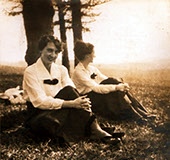
The Gates of Utterance
There is a throng within the gates,
A pressing, diverse throng;
Without, a peaceful throng awaits,
To which I would belong.
Within the gates the varied folk
Advise discordantly;
Without, the poet-crowds convoke
To council harmony.
Within the gates are all the heights
And depths of serried powers;
But when a lyric theme invites,
I reach out-lying bowers
Where dwell the bards of quiet years ;
I join my song to theirs;
My glad, unfettered spirit hears
The melody it shares.
Gladys Cromwell
(1885-1919)
The Gates of Utterance
From: Songs of the Dust, 1915
• fleursdumal.nl magazine
More in: Archive C-D, Archive C-D, Cromwell, Gladys, Gladys Cromwell
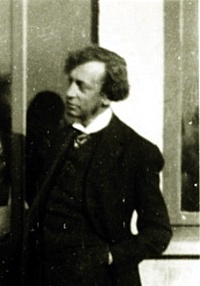
Gelijk een arme, blinde hond
Geljk een arme, blinde hond
van alle troost verstoken,
dwaal ‘k door de zoele avond rond
en ruik de lente-roken.
Er waart – lijk om een vrouwe-kleed
waar oude driften in hangen –
er waart een geur van schamper leed
en van huilend-moe verlangen.
En ‘k dwaal, een blinde hond gelijk,
door dralige lente-roken,
mijn hart van alle liefden rijk,
mijn hart van liefde verstoken.
Karel van de Woestijne
(1878 – 1929)
Gelijk een arme, blinde hond
• fleursdumal.nl magazine
More in: Archive W-X, Archive W-X, Woestijne, Karel van de
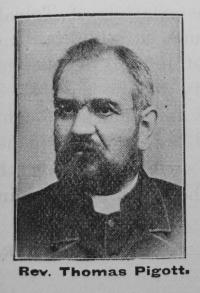
The Lion
(Being an essay written by a pupil
in Dame Europa’s School)
The Lion is a kind of Ass,
His silliness is simply crass ;
He’s such a tame, long-suffering beast
You cannot rile him in the least,
For, though he’s very, very strong,
He never will resent a wrong ;
So, though he’s very, very big.
The other beasts don’t care a fig,
But pinch his tail and tweak his ear.
For he won’t mind — He’s such a dear !
They give him most tremendous snubs.
And kill whole litters of his cubs ;
He’ll sometimes give one little roar,
Montague Horatio Mostyn Turtle Pigott
(1865–1927)
The Lion (Poem)
• fleursdumal.nl magazine
More in: Archive O-P, Mostyn Turtle Pigott, Natural history
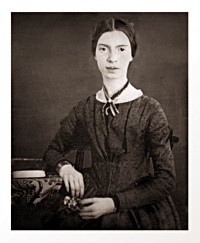
I measure every Grief I meet
I measure every Grief I meet
With narrow, probing, eyes –
I wonder if It weighs like Mine –
Or has an Easier size.
I wonder if They bore it long –
Or did it just begin –
I could not tell the Date of Mine –
It feels so old a pain –
I wonder if it hurts to live –
And if They have to try –
And whether – could They choose between –
It would not be – to die –
I note that Some – gone patient long –
At length, renew their smile –
An imitation of a Light
That has so little Oil –
I wonder if when Years have piled –
Some Thousands – on the Harm –
That hurt them early – such a lapse
Could give them any Balm –
Or would they go on aching still
Through Centuries of Nerve –
Enlightened to a larger Pain –
In Contrast with the Love –
The Grieved – are many – I am told –
There is the various Cause –
Death – is but one – and comes but once –
And only nails the eyes –
There’s Grief of Want – and grief of Cold –
A sort they call “Despair” –
There’s Banishment from native Eyes –
In sight of Native Air –
And though I may not guess the kind –
Correctly – yet to me
A piercing Comfort it affords
In passing Calvary –
To note the fashions – of the Cross –
And how they’re mostly worn –
Still fascinated to presume
That Some – are like my own –
Emily Dickinson
(1830-1886)
I measure every Grief I meet
• fleursdumal.nl magazine
More in: Archive C-D, Dickinson, Emily
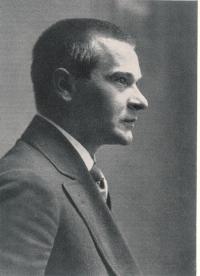
Die junge Magd
1
Oft am Brunnen, wenn es dämmert,
Sieht man sie verzaubert stehen
Wasser schöpfen, wenn es dämmert.
Eimer auf und niedergehen.
In den Buchen Dohlen flattern
Und sie gleichet einem Schatten.
Ihre gelben Haare flattern
Und im Hofe schrein die Ratten.
Und umschmeichelt von Verfalle
Senkt sie die entzundenen Lider.
Dürres Gras neigt im Verfalle
Sich zu ihren Füßen nieder.
2
Stille schafft sie in der Kammer
Und der Hof liegt längst verödet.
Im Hollunder vor der Kammer
Kläglich eine Amsel flötet.
Silbern schaut ihr Bild im Spiegel
Fremd sie an im Zwielichtscheine
Und verdämmert fahl im Spiegel
Und ihr graut vor seiner Reine.
Traumhaft singt ein Knecht im Dunkel
Und sie starrt von Schmerz geschüttelt.
Röte träufelt durch das Dunkel.
Jäh am Tor der Südwind rüttelt.
3
Nächtens übern kahlen Anger
Gaukelt sie in Fieberträumen.
Mürrisch greint der Wind im Anger
Und der Mond lauscht aus den Bäumen.
Balde rings die Sterne bleichen
Und ermattet von Beschwerde
Wächsern ihre Wangen bleichen.
Fäulnis wittert aus der Erde.
Traurig rauscht das Rohr im Tümpel
Und sie friert in sich gekauert.
Fern ein Hahn kräht. Übern Tümpel
Hart und grau der Morgen schauert.
4
In der Schmiede dröhnt der Hammer
Und sie huscht am Tor vorüber.
Glührot schwingt der Knecht den Hammer
Und sie schaut wie tot hinüber.
Wie im Traum trifft sie ein Lachen;
Und sie taumelt in die Schmiede,
Scheu geduckt vor seinem Lachen,
Wie der Hammer hart und rüde.
Hell versprühn im Raum die Funken
Und mit hilfloser Geberde
Hascht sie nach den wilden Funken
Und sie stürzt betäubt zur Erde.
5
Schmächtig hingestreckt im Bette
Wacht sie auf voll süßem Bangen
Und sie sieht ihr schmutzig Bette
Ganz von goldnem Licht verhangen.
Die Reseden dort am Fenster
Und den bläulich hellen Himmel.
Manchmal trägt der Wind ans Fenster
Einer Glocke zag Gebimmel.
Schatten gleiten übers Kissen,
Langsam schlägt die Mittagsstunde
Und sie atmet schwer im Kissen
Und ihr Mund gleicht einer Wunde.
6
Abends schweben blutige Linnen,
Wolken über stummen Wäldern,
Die gehüllt in schwarze Linnen,
Spatzen lärmen auf den Feldern.
Und sie liegt ganz weiß im Dunkel.
Unterm Dach verhaucht ein Girren.
Wie ein Aas in Busch und Dunkel
Fliegen ihren Mund umschwirren.
Traumhaft klingt im braunen Weiler
Nach ein Klang von Tanz und Geigen,
Schwebt ihr Antlitz durch den Weiler,
Weht ihr Haar in kahlen Zweigen.
Georg Trakl
(1887 – 1914)
Die junge Magd, 1913
•fleursdumal.nl magazine
More in: Archive S-T, Trakl, Georg, Trakl, Georg
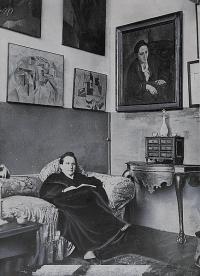 Johnny Grey
Johnny Grey
What did he say. I was disagreeing with him. He said he didn’t have it by his side. He said. Hurry.
Eat it.
I am not going to talk about it. I am not going to talk about it.
Another thing.
This is mentioned. He was silly. He said there would have been many more elevators if it hadn’t been for this war.
He was so thirsty.
They asked him.
Please.
If it weren’t for them there would be wind.
I said there wasn’t.
I said it was balmy.
I said that when I was little I asked for a closet.
This was the way it was written.
I was awed.
It is so injudicious to make plans.
We will not decide about three.
Three is the best way to add.
The bank opens tomorrow.
I was mistaken.
I hope I can continue.
To be a tailor.
The other said nothing.
The other one said he was hindering him and he made that mistake and he would not prepare further.
It is not deceiving.
I can say so gladly.
It’s always better.
It’s wonderful how it always comes out.
Conversational.
Plants were said to bring lining together. This is not deceived. This is not deceived. Plants.
Plants were said to bring meadows springing. Shattering stubbornly in their teeth.
Plants aid sad and not furniture.
This is it.
Plants are riotous.
Not even.
If you give money.
Plants are said to be left out if you give money.
Join or gray.
Points are spoken. This in one. Picturesque. It is just the same.
I cannot freeze.
I understand a picture. It is to have stop it who does. It is to have asked about it the sneezing bell. Bell or better.
A simple extenuation.
I mean to be fine with it.
A picture with all of it bitten by that supper. Call it. I shall please. Nowadays.
I find this a very pleasant pencil. Do I. I find this a very pleasant pencil. Do I find this a pleasant pencil.
How to give soldiers fresh water.
How do you.
You use the echoes.
Dear Jenny.
I am your brother. Nestling.
Nestling noses.
My gay.
Baby.
Little.
Lobster.
Chatter.
Sweet.
Joy.
My.
Baby.
Example.
Be good.
Always.
Six.
Seven.
Eight.
Nine.
All.
The.
Time.
Me.
Extra.
My.
Baby.
Scenes where there is no piece of a let it go.
No I am not pleased with their descriptions.
This is not their year.
Two of them.
Johnny Grey and Eddy.
Why not however.
It was not polite.
A long way.
I understand and I say, I understand him to say that, I see him I say I see him or I say, I say that I understand. What is it. He doesn’t realise. I don’t say that he isn’t there I don’t solidly favor him. I said I was prepared. I was prepared to relieve him. I was prepared to relieve him then or then and I was holding, I was holding anything. I am often for them. They gave it. They were pleased. So pleased and side with it. So pleased and have it. So have it and say it. Say it then. If he was promised, it, he had been left by the belief. He had the action. All old. In it. He was wretched. I do not believe or for it. I do not arouse rubbers. When we went away were we then told to be left with them. Do they or do they do it. Do they believe the truth.
I am beginning. Go on Saturday. I believe for Sunday. We deceived everbody.
I forgot to drink water.
No I haven’t seen it.
He said it.
It’s wonderful.
Target.
They don’t believe it either.
Call it.
That.
Fat.
Cheeks.
By.
That.
Time.
Drenced.
By.
That.
Time.
Obligation.
To sign.
That
Today
When
By
That
Field.
He said he was a Spanish family.
It will make.
A
Terrible
Not terrible.
It will not make that one believe me it is not for my pleasure that I promise it.
No
Neither.
That
Or
Another
Neither
One
Lightly
Widened.
Widened by what.
Not this.
Not left.
Buy
Their
It’s not a country.
I told him so.
I wish to begin.
Lining.
Of that thing.
By that time.
It.
Or.
It.
Was.
How.
We don’t know whom to invite for lunch. You told me you’d tell me. I don’t know.
Either.
I do get wonderful action into them don’t I.
Blame.
Worthy.
Out.
Standing.
Eraser.
That was a seat.
Leave it out.
Seat.
Stretch.
Sober.
Left.
Over.
Curling.
Irresistible.
I come to it at last.
I know what I want.
Call.
Tried.
To be.
Just.
Seated.
Beside.
The.
Meaning.
Please come.
I met.
A steady house which was neither blocking nor behaving as if it would for the road.
He looks like it.
A ladder insults.
Me.
I do stem when in.
I don’t look at them any more.
Johnny Grey.
What did I say.
I said I would leave it.
He was so kind.
That was lasting.
I am so certain.
Please.
It’s remarkable that I can make good sentences.
It reminds me of a play that I remember which is better.
It is better.
Everything.
In.
I am coming.
To it.
I know it.
Please.
Pleased.
Pleased with me.
Pleased with me.
Canvas covers.
I wished to go away.
I asked for an astonishing green I asked for more Bertie.
I asked only once.
Pack it.
Package.
A little leaving.
We went to eat.
I have plenty of food.
Always.
Nearly.
Always.
Certainly.
By an example.
I was never afraid.
He doesn’t say anything.
In that way.
Not after.
He was.
Sure.
Of it.
Then.
By then.
We were.
In Munich.
And sat.
Today.
By way
Of
Staring.
And nearly all of it.
In.
That.
Shining.
Firm.
Spread.
Paul.
Slices.
If I copy nature.
If I copy nature.
If I copy nature.
If I copy nature.
For it.
Open.
Seen
Piling.
Left.
In.
Left in.
Not in.
Border
Sew.
Spaces.
I.
Mean.
To.
Laugh.
Do be.
Do be all.
Do be all out.
If you can.
Come.
To stay.
And.
After.
All.
Have.
A.
Night.
Which.
Means.
That.
There
Is.
Not
This
Essential.
By that way.
It was all out in it.
By this time.
Which was reasonable and an explanation.
We never expected he would tell a lie.
Not this.
For.
More.
To be.
Indians are disappointing.
Not to me.
I was never disappointed in an Indian.
I was never disappointed in an Indian in any way.
How old are you.
Careless.
Heavy all the time.
I know she is.
I am.
Politely.
Finished.
Gertrude Stein
(1874-1946)
Johnny Grey
• fleursdumal.nl magazine
More in: Archive S-T, Archive S-T, Gertrude Stein, Stein, Gertrude
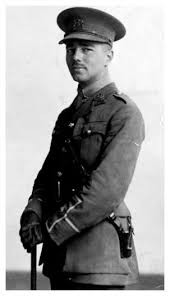
Strange Meeting
It seemed that out of battle I escaped
Down some profound dull tunnel, long since scooped
Through granites which titanic wars had groined.
Yet also there encumbered sleepers groaned,
Too fast in thought or death to be bestirred.
Then, as I probed them, one sprang up, and stared
With piteous recognition in fixed eyes,
Lifting distressful hands, as if to bless.
And by his smile, I knew that sullen hall,—
By his dead smile I knew we stood in Hell.
With a thousand fears that vision’s face was grained;
Yet no blood reached there from the upper ground,
And no guns thumped, or down the flues made moan.
“Strange friend,” I said, “here is no cause to mourn.”
“None,” said that other, “save the undone years,
The hopelessness. Whatever hope is yours,
Was my life also; I went hunting wild
After the wildest beauty in the world,
Which lies not calm in eyes, or braided hair,
But mocks the steady running of the hour,
And if it grieves, grieves richlier than here.
For by my glee might many men have laughed,
And of my weeping something had been left,
Which must die now. I mean the truth untold,
The pity of war, the pity war distilled.
Now men will go content with what we spoiled.
Or, discontent, boil bloody, and be spilled.
They will be swift with swiftness of the tigress.
None will break ranks, though nations trek from progress.
Courage was mine, and I had mystery;
Wisdom was mine, and I had mastery:
To miss the march of this retreating world
Into vain citadels that are not walled.
Then, when much blood had clogged their chariot-wheels,
I would go up and wash them from sweet wells,
Even with truths that lie too deep for taint.
I would have poured my spirit without stint
But not through wounds; not on the cess of war.
Foreheads of men have bled where no wounds were.
“I am the enemy you killed, my friend.
I knew you in this dark: for so you frowned
Yesterday through me as you jabbed and killed.
I parried; but my hands were loath and cold.
Let us sleep now. . . .”
Wilfred Owen
(1893 – 1918)
Strange Meeting (Poem)
• fleursdumal.nl magazine
More in: Archive O-P, Archive O-P, Galerie des Morts, Owen, Wilfred, WAR & PEACE
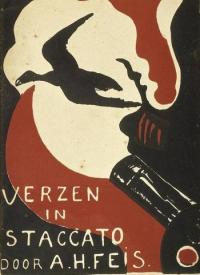
De slag.
De zon.
Een woud.
Een veld.
Een vliet:
‘t Is geel,
groen, blauw,
maar rood
is ‘t niet.
Gerij.
Gedraaf.
Geschut.
Gedreun:
Gegil!
Gekerm!
Gezucht!
Gekreun!
Geen zon.
Geen woud.
Geen mensch!
Geen hart!
‘t Is bloed!
‘t Is rood!
‘t Is grijs!
‘t Is zwart!
Agnita Feis
(1881 – 1944)
Uit: Oorlog. Verzen in Staccato (1916).
De Slag
• fleursdumal.nl magazine
More in: - Book Stories, Agnita Feis, Archive E-F, Archive E-F, De Stijl, Feis, Agnita, Theo van Doesburg
Thank you for reading Fleurs du Mal - magazine for art & literature